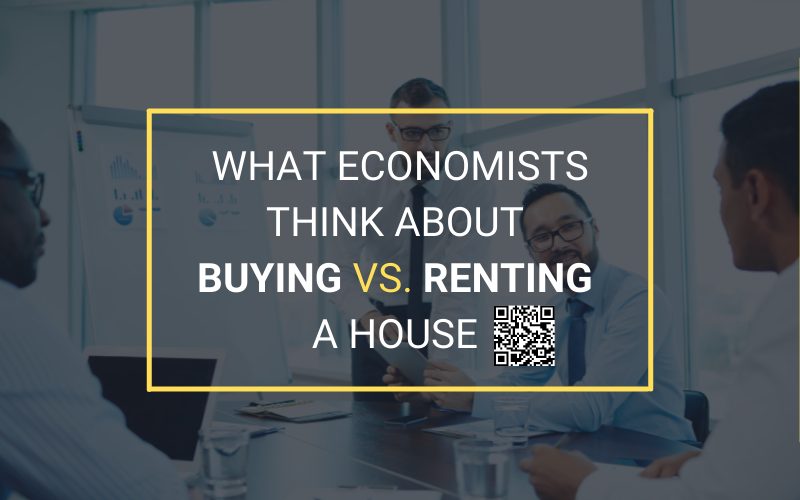Whether you’re simply looking for a home to settle down in or inspired to make your next big investment move, you’ll need to answer a question. Is it better to rent or buy a house? Well, there’s no clear answer (don’t worry, we can still help).
When looking through an economic lens, economists don’t have a unified answer to this question. A quick Google search will reveal arguments and counterarguments to this question time and time again — and sometimes even on the same forum!
Economists never claim that one is absolutely better than the other, and that’s because buying vs. renting is largely situational. Renting won’t always guarantee better benefits than housing, and vice versa.
Depending on your circumstances, assets, wants, needs, and dreams (yes, your dreams matter too!), you’ll want to approach buying vs. renting a house differently. In this blog post, we’ll be covering the circumstances, pros, and cons for choosing either of the two options!
The First Step: Circumstances to Consider
Before looking at the pros and cons of buying vs. renting a house, we have to look at which is suitable for your circumstances. To do this, we’ve created a set of questions for you to answer.
Can I Afford to Own A House?
As a new investor, people often fall into the pit trap of looking at only the mortgage price. The mortgage price is only a fraction of what you’re actually signing up for. To renovate a house to become attractive enough to rent out — that requires a substantial amount of money. The cost to hire a plumber, heating/cooling service, exterminator, and/or construction service is no joke.
When you rent, you only pay rent. There’s no need to worry about property taxes, HOA fees, general maintenance, seasonal damages, and so on. Besides utility, there’s else to worry about. Even if something breaks, you’ll be able to contact your landlord and get the issue resolved without much hassle.
Before making any choices, sit down and take a long look at your spendings. How much is in your budget? How much are you willing to spend? Do your best to account for everything if you decide to buy.
Is This the Right Time to Buy A House?
Technically, the economic standpoint right now is to hold off on buying a house. The price of houses are at a record high because of the pandemic. With the pandemic wrapping up, there are so many bidders for homes that you’ll find yourself paying way more than what a house is actually worth.
More than economics, there’s a personal element to consider too. Do you have other commitments? Are you already under a lot of stress? If you’ve answered yes to these questions, housing may exacerbate the problem.
Renting is a good alternative to buying because it has less responsibilities, and will reduce your chances of feeling burnt out.
Will My Life Change Dramatically Any Time Soon?
This question isn’t as easy to answer as the other two, but is still equally important to consider. If you believe that your life will change dramatically in the near future, buying a home will take away flexibility. Even though breaking a lease will be a bit more costly, you still have options when renting.
If your job or other streams of income are stable, you’re in the clear to buy a home. Otherwise, it is advisable that you stick with renting.
Renting: The Pros and Cons
If you get goosebumps at the mere thought of going to Home Depot, renting might be the best option for you. Here are the pros and cons that come with renting:
Pros
- No property taxes — The average American homeowner pays $2,741 in property taxes a year, with some paying as much $8,300 (Business Insider). When you rent, that cost tumbles all the way down to $0.00. If your landlord tries to pass this cost onto you — which they technically aren’t allowed to do — you can move without much hassle.
- Repairs are paid for — Maintenance is the landlord’s problem, not yours!
- Depreciating assets aren’t as much of a problem — When you rent, the risk of a sudden crash or depreciating assets falls on the landlord.
- Flexibility — If you suddenly have to move somewhere else, that’s no problem. Once your lease is up, moving on is a choice that’s completely up to you.
Cons
- Rent can increase — If real estate prices appreciate quickly, you should expect to pay a lot more for the same rent.
- No tax benefits — Benefits like mortgage deductions, property tax deductions, and breaks on capital gains are nulled when you rent instead of buy.
- Can’t customize — If you want to modify your rental, the landlord’s consent is required or else you’re breaking the contract.
- Doesn’t build equity — Your monthly payments build up the equity of your landlord, not your personal equity.
Buying: The Pros and Cons
Like renting, buying a house has certain advantages and disadvantages.
Pros
- Stable payments — When you have a fixed-rate mortgage, you’ll know exactly how much you need to pay each time the bill comes. As long as you keep the loan, your monthly principal and interest payment is set in stone.
- Builds equity — Though you pay your lender every month, the cash that you invest will eventually come back to you in the form of equity.
- Total control — Nothing’s stopping you from transforming your house. After all, you own it!
- Tax benefits — Benefits like mortgage deductions, property tax deductions, and breaks on capital gains are present.
Cons
- Lose of flexibility — Once you have a house, it just sits there unless you find yourself a buyer. Ownership creates roots that bind you from being flexible.
- Risk of decreased value — Economic decline could decrease the value of your home that is hard to recover from.
- Maintenance fees — From plumbing services to fixing an entire roof, the cost to maintain and fix the house will come out of your pocket.
- Taxes + more fees — With a home, you become liable to property taxes and HOA fees, which can rack up thousands of dollars in costs.
- Requires a down-payment — There’s a steep buy-in for houses that you may not be willing or able to make.





